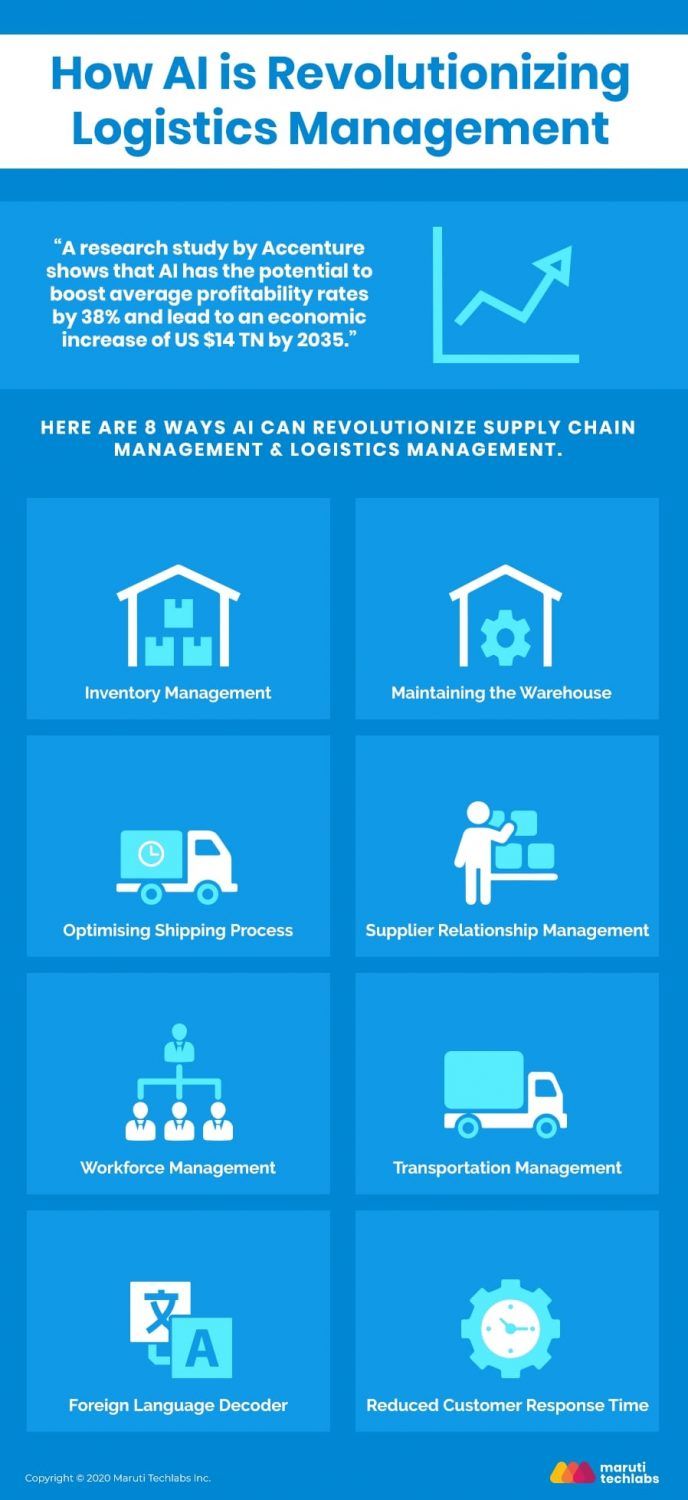How Artificial Intelligence Is Revolutionizing Logistics Management
The rise of Artificial Intelligence has fundamentally altered many sectors of the supply chain industry. Whether it is customer support, inventory management or handling of logistics, the contribution of new age, AI-based solutions is undeniable.
As per executives and experts within the field, the prediction is clear – AI is here to stay and further transform these fields over the upcoming years.
Computers can handle huge sets of data at a time, which would otherwise be impossible to humanely take into a single decision-making process. This is why Artificial Intelligence is a boon to Supply Chain Management.
Using numerous data sets and applying intelligent algorithms, a machine can analyse endless possibilities that lead to effective strategizing.
AI minimizes the risks of human error. In short, with the help of AI, operational efficiency can be maximized and costs can be minimized.
Elucidated below are 8 ways AI is revolutionizing the supply chain and logistics management-
- Inventory Management
- Maintaining the Warehouse
- Optimising Shipping Process
- Supplier Relationship Management
- Workforce Management
- Transportation Management
- Foreign Language Decoder
- Reduced Customer Response Time

Inventory Management
No business can run properly without a correctly maintained inventory. Both overstocking and understocking can be a detriment. With the right inventory management system, a business can simply concentrate on selling their product instead of managing its storage.
A crucial need for AI in inventory management, other than its ability to ensure the maintenance of stock, is its ability to predict demand. Algorithms are now capable of studying customer demands across vast chunks of data and understand which items will soon be in demand and which might fail to generate enough buzz. This is known as ‘demand forecasting’ and is widely used across businesses and online platforms around the world. Thus instead of relying on real-time demand, a business can be prepared beforehand and take stock accordingly. This has proven to be the most revolutionising aspect of AI in logistics.
Maintaining the Warehouse
With the rise in facial recognition in AI, machines are now capable of handling security. An unmanned warehouse can easily be kept safe by tracking all those who enter and leave it. Furthermore, machines can keep track of items being put on shelves and those leaving the warehouse by simply reading the barcode on the package and updating inventory accordingly.
Unmanned warehouses have taken the fancy of the bigwigs of the online selling game. So far, they have proven to be effective in emulating the methods of manned warehouses while being far more efficient by eliminating human error.
Optimising Shipping Process
The effectiveness of AI doesn’t simply diminish when the item leaves inventory. It is also used to predict the best possible shipping route. Machines use graph theory to predict the shipping routes that can balance between the fastest and most cost-effective for the company. This is especially handy for companies that service multiple customers as shipping routes are then predicted to minimise cost while maximising reach for as many customers as possible.
AI is also able to predict traffic conditions and peak hour situations. These are factors that affect a company’s shipping time. By avoiding peak hour traffic and scheduling delivery during the lightest traffic hours, one can ensure that their delivery executives spend less time waiting on roads and more time delivering to even more people. Thus, effectiveness, and in turn, profits are maximised.
Supplier Relationship Management
Shipping and logistic management isn’t the only phase of the supply chain process that AI helps maintain. One of the most important aspects of any business is its supplier. Identifying the right suppliers and maintaining a list of each item, corresponding to those suppliers is important. When refilling inventory or recalibrating item needs according to demand, the relationship with one’s suppliers is the deciding factor of how smoothly the transaction will run.
AI can monitor supplier parameters such as cost, credit score, quantifiable past experiences such as delivery speed, and create a list of the best possible options for any given situation. This ensures that a business runs smoothly and the relationship between it and its suppliers remains effective, unbiased and cordial.
Workforce Management
Needless to say, with an effective AI managing your supply chain, dependence on an administrative staff becomes minimum. However, this isn’t the only use case for AI in workforce management. Today, Artificial Intelligence is being effectively used in recruiting employees, training them on the job, monitoring day to day performance, rating their performance as well as segregating their strengths and weaknesses to ensure each employee is assigned to a task they are best suited for.
AI can help an organisation plan its hiring and training process more effectively. This allows for smooth day to day transactions on the floors of the organisation. It also makes the work assignments better suited, leading to happy employees.
Transportation Management
It is usual practice for many businesses to enter into contracts with shipping companies to deliver their goods. Some bigger companies, such as Amazon also have their own shipping division. As we already discussed, AI makes the whole experience a lot smoother when it comes to time and efficiency management for shipping. However, there is a lot more that AI can do. Artificial Intelligence can take away all the issues arising from the human problem.
Whenever there are people driving delivery trucks, there is a limited amount of time they can function. Having multiple drivers on the same route, to cater to the need of a 24×7 delivery system, is expensive. This is where AI in logistics can prove to be a lifesaver by automating the whole driving function. In fact, one of the largest door to door delivery businesses in the world, Amazon, has already shown great faith in automated delivery vehicles. As of 2019, Amazon has a combined investment of over a billion US dollars in Tesla competitor Rivian and autonomous driving startup Aurora. If this is anything to go by, we can safely assume that AI will gradually play an even larger role in building a transportation management solution.
Foreign Language Decoder
The world is a global village. Despite the language and cultural barriers, every part of the world is consuming everything the other parts serve. As a business today, you are expected to cater to a global audience. As a result, miscommunication is a common problem. And not just miscommunication between the business and the customer, understanding foreign products or market trends may be a problem, as well.
However, with AI, this barrier no longer exists. Moreover, AI customer support systems and chatbots are also far better equipped to handle foreign customers without a business having to go to the trouble of hiring too many offshore support executives. Overall, AI makes the job easier.
Reduced Customer Response Time
One of the aspects of AI that businesses across the world are now leveraging is its foray into customer service. Chatbots have reduced the customer response time to almost zero and have reduced the number of customer service representatives any business needs to support to a minimum. Apart from being always to the point, polite and effective, chatbots are also a blessing when it comes to dealing with foreign customers who aren’t native speakers of the languages a business supports. AI has ensured much faster and effective customer service and chatbots are one of the primary advancements of AI in logistics.
AI in Logistics Management – Need For Improvement
We have long discussed the advantages of having AI as a part of a business’ supply chain management. But there is still a need for improvement in certain areas of AI in logistics. One of the biggest drawbacks of integrating AI into your system is getting them to work with all the legacy software most established businesses work on. There is also the matter of skill gap. Most employees working with businesses are not well acquainted with the new age scripting languages that support AI and ML systems. This means the business must find apt talent to manage their systems.
Businesses have the opportunity to leverage AI's potential to optimize their operations and enhance supply chain efficiency, whether through the utilization of AI as a service or by engaging AI development services.
Moreover, AI, in its current form, isn’t completely self-sufficient. It still needs human supervision. Given the large volume of data AI systems handle, any error in the system is crucial to spot and can hold a business at ransom if they are solely dependent on AI systems with no backup in place. As is the case with any computer software, there can be security issues affecting a system.
However, training and updating AI models over time with the right expertise can pave the path to determining superiority in the domain of supply chain management.
Some Leading Companies That Use AI

Rolls Royce
Back in 2017, Rolls Royce partnered up with Google to build autonomous ships. Using AI, much like self-driving cars, they tried creating ships that can function with a minimum crew. The idea was to replace crew members with intelligent machines that could load and unload cargo, navigate through the ocean, without needing human intervention. The final goal is to make shipping and delivery of goods even faster.
UPS
One of the leading parcel delivery companies, UPS, uses an AI-powered GPS called ORION (On-road Integrated Optimisation and Navigation) to find the fastest and most cost-efficient route for its fleet. With data submitted by customers, drivers, and vehicles, ORION uses an algorithm to detect the optimal route for each delivery. It is a real-time system that modifies the routes depending on current traffic and other conditions.
Marble
Marble is a logistics company that has taken the idea another step further. It uses robots that run on the same AI system as automated cars (LIDAR) to deliver goods to people’s doorsteps. It cuts down the risk of a driver, is environment-friendly, and a fast and cost-effective way of getting the work done.
Lineage
Lineage uses AI to manage its warehouses. The algorithm predicts which items will stay in the warehouse longer and which will leave soon. Based on this, the items that will stay longer are stored towards the back, and the ones that will leave quicker are kept in the front. Using this approach, Lineage has, in fact, increased its efficiency by over 20%.
The Future
Use of AI in logistics is a relatively new concept, and although it seems to be thriving, a very small percentage of businesses are using it as of now. The rise in the number of organisations that use AI has practically tripled over the past five to six years. By 2021, about 80% of the upcoming technologies will have their foundation in AI. The most investment in AI has been in customer relations as a part of supply chain management. In fact, more than 60% of people prefer to interact with chatbots than actual customer service representatives.
Although the supply chain has taken a chunk of its volume, AI is hardly limited to warehouses and self-driving cars. It is there when Netflix or YouTube recommends a video or when Facebook shows you a holiday trip similar to the one you had been eyeing for months. AI is working in the background of our constant companions which is our phones. AI is everywhere.
Any business that does not leverage the best of AI in logistics, whether for shipping and logistics management or a transportation management solution, is simply giving up on its chance to grow and keep up with the competition. Choosing the right AI solution for your business is the first step towards future success.


















